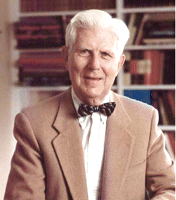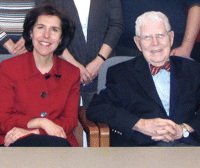Aaron Beck, M.D., is one of the most important figures in American psychiatry, John Talbott, M.D., a professor of psychiatry at the University of Maryland and a former APA president, contends.
Beck, a university professor emeritus of psychiatry at the University of Pennsylvania, is widely regarded as the father of cognitive therapy.
Since Beck will be turning 90 years old on July 17, Psychiatric News decided to use the occasion to take a look at the man and his career.
So who is this man?
"Beck is a bold guy who does things," Eric Kandel, M.D., a university professor at Columbia University and a winner of a Nobel Prize in medicine, declared at the January meeting of the American Psychoanalytic Association. Kandel also urged analysts at the meeting to conduct more research along the lines of the psychotherapy research that Beck has been conducting for decades (Psychiatric News, March 4).
"Aaron Beck is extremely smart, is a high achiever, and has been a wonderful mentor to thousands of people, including his children," Beck's daughter Judith Beck, Ph.D., said during a recent interview. She is president of the Beck Institute for Cognitive Therapy and Research in Philadelphia, where her father serves as president emeritus. Her brother, Daniel, a social worker in Boston, also does cognitive therapy. So does one of Aaron Beck's granddaughters.
"Aaron Beck has a quick wit and is very playful," David Brent, M.D., chief of child and adolescent psychiatry at the University of Pittsburgh, told Psychiatric News. "His wit and playfulness, I think, are what have allowed him to be creative. He never takes any idea too seriously until he has played with it for a while and thought it through. I remember being at a training session he was at. A professor from a major university played the role of a difficult adolescent. Everything the professor said, Beck disarmed him. Finally the professor asked, ‘Are you trying to trick me?’ ‘Why, yes,’ Beck said without missing a beat. And I thought, you can't teach that! That interaction really says a lot about Beck."
"I would describe him as a modest, humble, and generous man—open to colleagues and students who want to ask him questions and engage him in discussion," Glen Gabbard, M.D., a professor of psychiatry and chair of psychoanalysis at Baylor College of Medicine, commented. "He also has a searching, curious mind and is tireless in terms of energy. And one of the things I've always admired about him is his warmth and friendliness to me, a psychoanalyst who is not a cognitive therapist, and his open-mindedness to ideas outside his own field. One time at an APA meeting, for instance, he bought one of my books on countertransference. I asked him why. ‘Well, I'm having difficulty with one of my patients and thought it might help me,’ he replied. That speaks to the kind of man he is."
Several Achievements Stand Out
Undoubtedly Beck's two blockbuster achievements have been developing a cognitive theory of depression and then devising a treatment for it that works—cognitive therapy. "His cognitive theory of depression was revolutionary coming from a psychoanalytic paradigm," Brent observed. Beck agreed: "I think it was on the basis of that work that I got the Lasker Award."
But he has made other contributions to psychiatry as well, experts familiar with his work concurred. For example, he has developed cognitive-therapy modalities not just for depression, but for other psychiatric illnesses, and these modalities are being used in countries throughout the world. He undertook research that resulted in the creation of the Beck Depression Inventory, the Beck Hopelessness Scale, and the Beck Scale for Suicidal Ideation; they have been used for decades and have withstood the test of time.
Beck "has transformed the field of psychotherapy into one that is much more rigorous in terms of science because of his emphasis on demonstrating that a therapy works through research," Gabbard noted.
Criticism Sometimes Followed
Yet these accomplishments have not come without cost.
"He had to face a lot of criticism for challenging long-held psychoanalytic assumptions such as that depression was anger turned inward," Gabbard pointed out, "[because] at the time he started his work, psychoanalysis was far and away the most influential type of psychotherapy."
Beck realized that to study something like depression or suicide, you had to measure it, and since there weren't any instruments for measuring it, he would have to devise his own, Brent said. That's why Beck devised the Beck Depression Inventory, the Beck Hopelessness Scale, and the Beck Scale for Suicidal Ideation.
Each time he has wanted to develop a cognitive therapy for a particular psychiatric disorder, he has had to modify the original cognitive-therapy model that he developed for depression. "I try to initially understand the disorder, then develop a cognitive therapy treatment for it, then test the treatment in a randomized clinical trial if possible," he explained.
"There have been other challenges too," Beck told Psychiatric News, "for example, the challenge of disseminating cognitive therapy, first within the profession and then to the public, so that people know about it and will be interested in receiving it."
Facing Biggest Hurdle Yet
Now that Beck is almost 90, one might assume that he is sitting back and savoring his achievements. Yet he is not only still working, but also attempting to see whether cognitive therapy can help people with the most devastating of psychiatric illnesses—schizophrenia. As Brent observed, "It seems as if he has tackled progressively more difficult challenges as his life has progressed." Beck agreed, noting, "I would say that, toward the tail end of my career, I face the biggest challenge of all, which is understanding and treating schizophrenia."
Essentially what Beck and his colleagues have done is this: They devised a special form of cognitive therapy for patients with schizophrenia, taking into account the complexities and severity of the disorder. The therapy is intended to be an add-on therapy to pharmacological treatment and to improve patients' social and occupational functioning. The therapy "focuses on patients' negative beliefs, demoralization, stigmatization, complacency, and giving up and tries to help them change such beliefs and attitudes," Beck said.
Beck and his team then undertook a randomized clinical trial to see whether this type of cognitive therapy fulfilled its purpose. The cohort included 60 individuals who had schizophrenia for many years. Their symptoms were stabilized by psychotropic medications, but they were low functioning. All of them were getting treatment at public mental health centers.
At the start of the trial, all of the subjects received mental health, social functioning, and physical functioning evaluations. Then for 18 months, all continued to receive their usual care, but half also received the cognitive therapy designed by Beck and his group. After 18 months, subjects again were evaluated.
"There was practically no change in the people getting care as usual only," said Beck. "At least they were not getting any worse for the most part. But the group getting cognitive therapy plus usual care showed both a statistically significant improvement and a clinically significant improvement in physical and social functioning. Thus the cognitive therapy appeared to fulfill the purpose for which we had designed it."
But the cognitive-therapy subjects experienced something else as well, something that Beck and his colleagues hadn't expected—improvement of their delusional and hallucinatory symptoms. "This was quite intriguing," he said, "since we only dealt with psychotic symptoms in terms of their getting in the way of people's social improvement. What seems to have happened, what is exciting to us, is that cognitive therapy seems to have gotten subjects more engaged in reality, and this engagement in turn appears to have reduced their psychotic thinking."
These findings are in press with the Archives of General Psychiatry, Beck noted.
Beck and his team will also attempt to repeat their trial, but using more rigid controls, to see whether they can produce similar findings. And if other scientists can likewise confirm their results, then he would consider it a major breakthrough, Beck said.
Most people who know Beck think that in the years to come, he will be best remembered as the father of cognitive therapy. Beck, however, hopes that he will be best remembered for adapting cognitive therapy to help people with schizophrenia.


